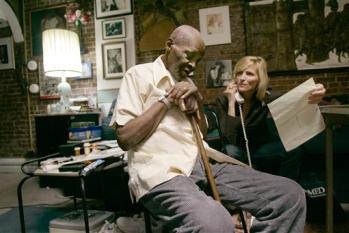Gay Elders’ Distinctive Challenges Up Close
Posted on October 5, 2008
Filed Under Gay/Lesbian, Health, New York, Women | Comments Off on Gay Elders’ Distinctive Challenges Up Close
 photo: Mary Altaffer
photo: Mary Altaffer
Frank Carter was once a globe-trotting professional dancer; his world is smaller now. He battles multiple health problems, walks with a cane and rarely leaves his compact Manhattan apartment.
As an 86-year-old gay man, with no family nearby and many acquaintances long since dead, he’d seem a likely prospect for isolation.
Instead, he has kindled a deep, five-year friendship with Gigi Stoll, a fashion model-turned-photographer half his age. Stoll helps Carter with medical arrangements, writes to him when she travels overseas, and sat with him for six hours during his most recent hospitalization.
“The other guys in the hospital, no one was coming in to see them,” Carter said. “To get that gift, you have to be lucky.”
It’s not just luck. Stoll came into his life though a program that matches infirm gays and lesbians with volunteers who commit to making weekly visits.
Long overlooked by society at large, and even by younger gays, elderly gays and lesbians are emerging as distinct community, getting more help and attention as they confront challenges that differ in many ways from their heterosexual counterparts.
Advocacy groups say the estimated 2.5 million gay seniors in America are twice as likely to live alone, four times less likely to have adult children to help them, and far more fearful of discrimination from health care workers.
Many fear anti-gay animosity or bias at senior centers, in nursing homes and from health care providers. Some gay elders even keep their sexual orientation secret from the home health aides who may provide their only sustained company.
A watershed moment comes this month, when the AARP — the largest advocacy group for Americans over 50 — for the first time sponsors a major national conference focused on gay and lesbian aging. It’s being organized by SAGE (Service and Advocacy for GLBT Elders), the New York-based organization which counts Carter and Stoll among its thousands of clients and volunteers. Full Story






